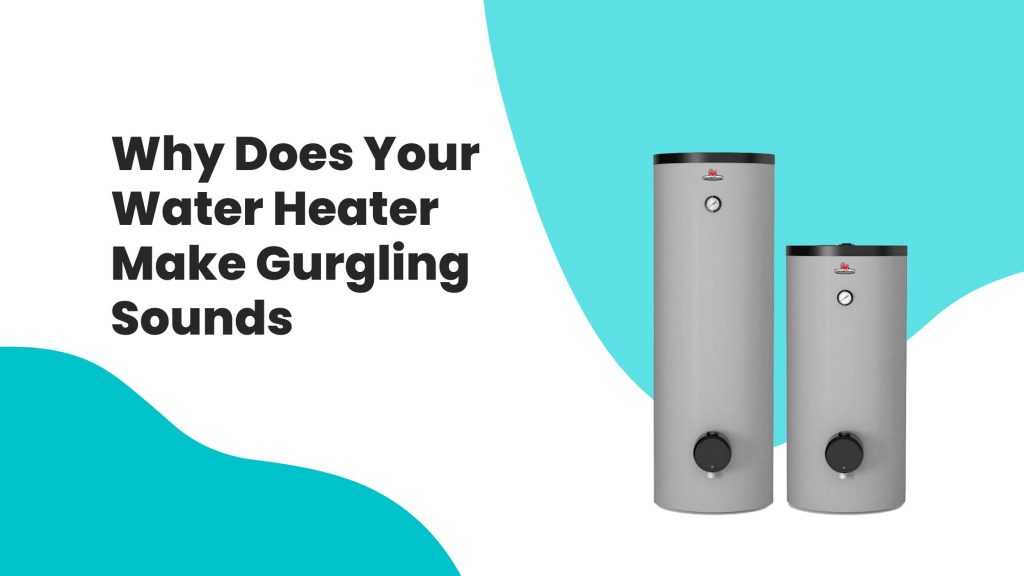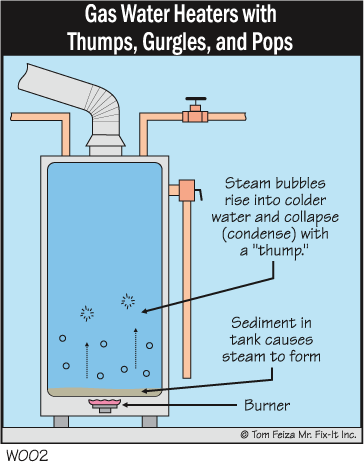A gurgling noise from a new water heater often indicates trapped air or sediment buildup. Addressing these issues promptly can prevent potential damage.
A new water heater should ideally operate quietly. Hearing gurgling noises can be concerning for homeowners. These sounds often indicate underlying issues that may need attention. Trapped air or mineral deposits can cause the water heater to function inefficiently. Ignoring these noises may lead to bigger problems down the line.
Identifying the source of the sound is crucial for maintaining your water heater’s efficiency and longevity. Regular maintenance can help prevent these issues and ensure optimal performance. Understanding why your water heater is making unusual noises can save you time and money in repairs. Keep your system in top shape by staying vigilant about its sounds.

Credit: smilehvac.ca
Page Contents
- 1 Introduction To Gurgling Noises In New Water Heaters
- 2 Identifying The Source Of The Gurgling
- 3 Common Causes Of Gurgling Noises
- 4 Quick Fixes For Sediment Buildup
- 5 Addressing Water Flow And Pressure Problems
- 6 Troubleshooting Valves And Fittings
- 7 When To Call A Professional
- 8 Preventive Measures And Regular Maintenance
- 9 Frequently Asked Questions
- 10 Conclusion
Introduction To Gurgling Noises In New Water Heaters
Gurgling noises in new water heaters are quite common. Many homeowners face this issue. These sounds often indicate air trapped in the pipes. Sediment buildup can also cause these noises.
Before troubleshooting, check a few things. Ensure the heater is correctly installed. Look for any loose connections or fittings. Temperature settings might also contribute to the noise.
Consider the age of the water heater. New models sometimes have different operational sounds. Regular maintenance can help prevent gurgling noises. Listening to these sounds can provide clues about the issue.
Identifying The Source Of The Gurgling
Gurgling noises from a water heater can mean different things. Some sounds are normal. They often happen during heating cycles. Other sounds can indicate problems. Issues may lead to damage or high energy bills.
Listen carefully to the sounds your heater makes. Normal sounds can include bubbling or soft humming. Problematic sounds include loud gurgles or clanging. These may suggest sediment buildup or other issues.
| Sound Type | Description |
|---|---|
| Normal Sounds | Bubbling or soft humming during heating |
| Problematic Sounds | Loud gurgles or clanging indicating potential issues |
Using tools like a stethoscope can help pinpoint the source. Listening closely can reveal if the noise is coming from the tank or pipes. This helps in deciding the next steps for repair or maintenance.
Common Causes Of Gurgling Noises
Sediment buildup occurs in water heaters over time. It forms from minerals in water. This buildup can block water flow, causing gurgling noises.
Water flow and pressure issues can also lead to these sounds. Low pressure may cause air to enter the system. This air creates bubbles that make gurgling noises.
The role of valves and fittings is crucial. Faulty or blocked valves can affect water flow. Ensuring all fittings are tight helps reduce unwanted sounds.
Quick Fixes For Sediment Buildup
Flushing the water heater helps remove sediment buildup. Turn off the power and water supply first. Connect a garden hose to the drain valve. Open the valve and let the water flow out. Flush until the water is clear.
Using a deliming solution can also help. Follow the instructions on the product. This solution breaks down mineral deposits. After treatment, flush the heater again with clean water.
Preventive measures can keep your heater running smoothly. Regularly flush the heater every six months. Install a water softener if you have hard water. Check the anode rod yearly for wear. Replace it as needed to avoid corrosion.
Addressing Water Flow And Pressure Problems
Addressing water flow and pressure problems is vital for a smooth operation. Start by adjusting the pressure valve. This helps maintain optimal pressure levels.
Check for closed valves or blockages in the system. Blocked pipes can lead to strange noises. Look for any obstructions in the water lines.
Inspect your water heater regularly. Ensure all connections are secure. This can prevent unwanted gurgling sounds.
Clear any debris around the heater. Keep the area clean to avoid future issues. Regular maintenance helps keep everything running smoothly.

Credit: misterfix-it.com
Troubleshooting Valves And Fittings
Gurgling noises from a new water heater often mean faulty valves. Check the temperature and pressure relief valve first. If it is leaking, replace it immediately.
Next, inspect the shut-off valve. If it does not close properly, it may need replacement. Tightening loose connections can also help eliminate gurgling sounds.
Ensure that all fittings and connections are secure. Loose connections can cause air to enter the system. This air can create gurgling noises.
Use plumber’s tape on threaded connections to prevent leaks. Regular maintenance of valves and fittings will keep your water heater running smoothly.
When To Call A Professional
Gurgling noises from a new water heater can indicate serious issues. Ignoring these sounds may lead to bigger problems. Check for leaks or blockages in the system. If the noise persists, a professional should be consulted.
Choosing the right service provider is crucial. Look for licensed technicians with good reviews. Ask for recommendations from friends or family. Compare prices and services offered by different companies. Ensure they provide a warranty for their work.
| Service Provider | Licensing | Reviews | Warranty |
|---|---|---|---|
| Provider A | Yes | 4.5/5 | 1 Year |
| Provider B | Yes | 4.0/5 | 2 Years |
| Provider C | No | 3.5/5 | No Warranty |

Credit: www.sunheating.com
Preventive Measures And Regular Maintenance
Regular maintenance helps keep your water heater running well. Schedule yearly check-ups with a professional. Check the pressure relief valve every six months. Flush the tank to remove sediment build-up. This improves efficiency and reduces noise.
For long-term noise reduction, consider insulation for pipes. Insulating reduces vibrations and keeps water hot. Upgrading to a modern, quieter model can also help. Look for water heaters labeled as “low noise.”
Monitor water temperature, keeping it below 140°F. High temperatures can cause noise and overheating. Check for loose components and tighten them. Regular checks keep your system quiet and efficient.
Frequently Asked Questions
Why Is My Heater Making A Gurgling Sound?
A gurgling sound from your heater often indicates trapped air in the system. This air disrupts water flow, causing noise. Flushing the system or bleeding the radiators can resolve the issue. Regular maintenance helps prevent this problem and ensures efficient heating.
What May Cause A Gurgling Or Popping Sound Coming From A Firing Water Heater?
A gurgling or popping sound from a firing water heater often indicates sediment buildup. This sediment can trap water, causing it to heat unevenly. Other causes may include faulty heating elements or air bubbles. Regular maintenance helps prevent these issues and prolongs the water heater’s lifespan.
Why Is My Brand New Water Heater Making A Popping Sound?
A popping sound from a new water heater often indicates sediment buildup. As water heats, trapped air bubbles can pop, causing noise. Ensure proper installation and maintenance. If the sound persists, consult a professional to check for issues. Regular flushing can help prevent future problems.
Why Does My Brand New Water Heater Make Noise?
A brand new water heater may make noise due to sediment buildup, air in the lines, or expansion and contraction of materials. These sounds are often normal during initial use. If noise persists, consider consulting a professional for further evaluation.
Conclusion
A gurgling noise from your new water heater can indicate underlying issues. Regular maintenance and prompt attention can prevent bigger problems. Always consult a professional if you’re unsure. Keeping your water heater in top shape ensures efficiency and longevity. Stay proactive to enjoy consistent hot water without surprises.
